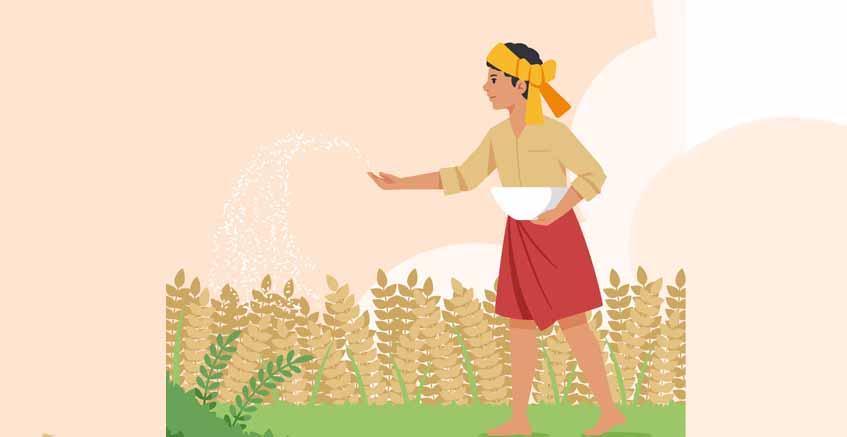People today are disconnected from nature and unaware of where their food actually comes from. With the rise of fast food and the convenience of grocery stores, it’s easy to forget about the hard work that goes into growing the food we eat. Now, more than ever, it’s important to teach children about who farmers are and what they do.
Farmers are the backbone of our food supply. They plant, grow, and harvest the crops that feed us every day. Farmers play a critical role in ensuring that food reaches our tables, from fruits and vegetables to grains, dairy, and meat. However, farming isn’t just about planting seeds and watching them grow. It involves understanding the land, the weather, and the many challenges that come with producing food.
This article tries to understand who farmers are and the importance of farming.
What is a Farmer?
A farmer is someone who owns or manages a farm. They play a crucial role in society by providing food for people. Some farmers grow crops, while others raise dairy cows to produce milk. Farmers work in agriculture, which includes growing fruits, vegetables, and grains or raising animals for milk, eggs, and meat.
What Do Farmers Do?
Farmers play a crucial role in managing farms, ranches, and other agricultural businesses. Their responsibilities vary based on the type of farming they do. For instance, farmers who grow fruits, vegetables, grains, and other crops also perform tasks such as selecting high-quality seeds, preparing the soil, planting, watering, and protecting crops from pests and diseases. They also monitor weather conditions and use fertilizers or organic methods to ensure a good harvest.
Meanwhile, farmers who take care of the livestock raise animals such as cows, chickens, and sheep for milk, eggs, wool, or meat. They must ensure their animals are well-fed, housed safely, and protected from diseases.
Beyond farming, farmers also manage farm workers, oversee finances, and maintain equipment like tractors, irrigation systems, and harvesting machines to keep their operations running smoothly.
Role of a Farmer
As mentioned above, farmers might have many responsibilities depending on the kind of farming they do. For instance, a farmer who takes care of the livestock has to not just look at the produce but also the health and well-being of the animals. This emphasises that farmers need to understand agriculture well, whether it’s selecting seeds for crops, raising healthy animals, or maintaining farming tools. In addition to farming knowledge, they must know about planting seasons, harvesting times, and how to keep their equipment in good condition.
How Does One Become a Farmer?
Many farmers come from farming families, where skills and knowledge are passed down through generations. They learn how to care for crops, animals, and soil from their parents and elders. Farming began when people noticed how plants grew from seeds and protected them from animals and bad weather. Over time, they developed better farming methods to grow enough food for their communities.
Types of Farming
There are different types of farms. Depending on the country and the economy, here are some common types of farms:
- Subsistence Farming: In less developed countries, small farmers grow food only for their families. They have little or no extra food to sell.
- Commercial Farming (Agribusiness): In wealthier countries, farming is a large-scale business. Big companies own farms that produce massive amounts of food for sale.
Methods of Farming
Over time, farming techniques have improved with better tools and machines. Farmers now use tractors and advanced equipment to plant and harvest crops faster.
- Irrigation: Farmers in dry areas use artificial watering systems to grow crops.
- Pesticides and Chemicals: Some farmers use chemicals to protect crops from insects and diseases. However, these chemicals can harm people and the environment.
- Organic Farming: Some farmers choose not to use chemicals and grow food naturally. This is known as organic farming.
Importance of Farmers
Farmers play a crucial role in our lives. Their hard work ensures we have enough food every day. Here’s why farmers are important:
- They grow fresh fruits, vegetables, and other food we eat.
- They work tirelessly despite many challenges like bad weather and financial struggles.
- They help sustain human civilization by providing essential resources.
Without farmers, we wouldn’t have the food we need to survive. Their efforts keep communities fed and economies strong.
Conclusion
In conclusion, farmers are the backbone of society. Their hard work ensures that fresh fruits, vegetables, grains, dairy, and meat are available to people around the world. Whether they grow crops or raise animals, farmers play a crucial role in feeding communities and supporting the economy. Despite facing challenges like unpredictable weather, pests, and changing market demands, they continue to adapt and innovate to meet the needs of a growing population. By understanding and appreciating the efforts of farmers, parents can teach their children to appreciate the efforts of farmers and have greater respect for the food they eat.
If you want your kids to reconnect with their roots, check out our blog, Unveiling the Rich History of Ancient Indian Civilization, to teach them the importance of ancient Indian history. You can also visit the EuroKids Blog for insightful information about your little one’s development, health, and learning.
Don’t forget to visit EuroKids Preschools to give your little ones the start they deserve!















